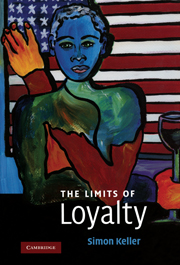Book contents
- Frontmatter
- Contents
- Preface
- Acknowledgements
- Chapter 1 What is loyalty?
- Chapter 2 Friendship and belief
- Chapter 3 What is patriotism?
- Chapter 4 Against patriotism
- Chapter 5 Filial duty: debt, gratitude and friendship
- Chapter 6 Filial duty: special goods and compulsory loyalty
- Chapter 7 Is loyalty a value? Is loyalty a virtue?
- Chapter 8 Communitarian arguments for the importance of loyalty
- Chapter 9 Josiah Royce and the ethics of loyalty
- Chapter 10 Disloyalty
- Conclusion
- Postscript: universal morality and the problem of loyalty
- Bibliography
- Index
Chapter 3 - What is patriotism?
Published online by Cambridge University Press: 22 September 2009
- Frontmatter
- Contents
- Preface
- Acknowledgements
- Chapter 1 What is loyalty?
- Chapter 2 Friendship and belief
- Chapter 3 What is patriotism?
- Chapter 4 Against patriotism
- Chapter 5 Filial duty: debt, gratitude and friendship
- Chapter 6 Filial duty: special goods and compulsory loyalty
- Chapter 7 Is loyalty a value? Is loyalty a virtue?
- Chapter 8 Communitarian arguments for the importance of loyalty
- Chapter 9 Josiah Royce and the ethics of loyalty
- Chapter 10 Disloyalty
- Conclusion
- Postscript: universal morality and the problem of loyalty
- Bibliography
- Index
Summary
THE PHILOSOPHICAL DEBATE ABOUT PATRIOTISM
Most people think that patriotism is a virtue. That, at least, is what is suggested by a quick glance at the political world and the popular media in contemporary western societies. Politicians constitute an extreme case – I think that many of them would rather be called cowardly, selfish or corrupt than unpatriotic – but their case is odd only for its extremeness. In everyday life, it seems as though you are usually offering a compliment when you call someone a patriot, and as though patriotism is usually thought to be something that we should foster in our children and ourselves. Patriotism, in the popular imagination, may not quite rank alongside kindness, justice, honesty and the like, but it is a virtue nonetheless; it is a character trait that the ideal person would possess.
I think that this common view is mistaken. Patriotism is certainly not a virtue, and is probably a vice. In Chapter 2, I tried to show that friendship often involves a certain sort of loyalty in belief, which can bring the standards of good friendship into conflict with other important evaluative standards. The next two chapters argue that patriotism, too, involves loyalty in belief, but of a more pervasive and damaging kind.
- Type
- Chapter
- Information
- The Limits of Loyalty , pp. 52 - 70Publisher: Cambridge University PressPrint publication year: 2007
- 1
- Cited by



